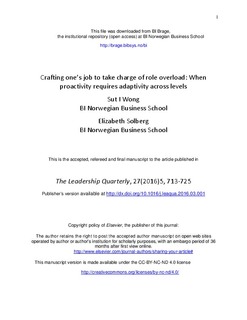| dc.contributor.author | Wong, Sut I | |
| dc.contributor.author | Solberg, Elizabeth | |
| dc.date.accessioned | 2016-11-10T09:35:52Z | |
| dc.date.available | 2016-11-10T09:35:52Z | |
| dc.date.issued | 2016 | |
| dc.identifier.citation | The Leadership Quarterly, 27(2016)5, 713-725 | nb_NO |
| dc.identifier.issn | 1048-9843 | |
| dc.identifier.issn | 1873-3409 | |
| dc.identifier.uri | http://hdl.handle.net/11250/2420407 | |
| dc.description | This is the accepted, refereed and final manuscript to the article published | nb_NO |
| dc.description.abstract | The present study investigates employees’ job crafting behavior in the context of perceived role overload, and identifies employees’ perceived ability to deal with work change (i.e., “perceived adaptivity”) and leaders’ need for structure as moderators positively influencing this relationship. A two-wave panel field study of 47 leaders and 143 employees in a Norwegian manufacturing firm found that perceived role overload related negatively to employees’ job crafting, as hypothesized. Employees’ perceived adaptivity alone did not increase job crafting in role overload situations, as predicted. Rather, the relationship between perceived role overload and job crafting was only positive when employees’ perceived adaptivity was high and their leaders’ need for structure was low. Thus, employees’ job crafting in role overload situations depends on the interactive fit between employees’ and leaders’ adaptive capabilities. Implications for the socially embedded theory of job crafting and leadership practice are discussed. | nb_NO |
| dc.language.iso | eng | nb_NO |
| dc.publisher | Elsevier | nb_NO |
| dc.title | Crafting one’s job to take charge of role overload: When proactivity requires adaptivity across levels | nb_NO |
| dc.type | Journal article | nb_NO |
| dc.type | Peer reviewed | nb_NO |
| dc.source.journal | The Leadership Quarterly | nb_NO |
| dc.identifier.doi | http://dx.doi.org/10.1016/j.leaqua.2016.03.001 | |
| dc.description.localcode | 2, Forfatterversjon | nb_NO |
